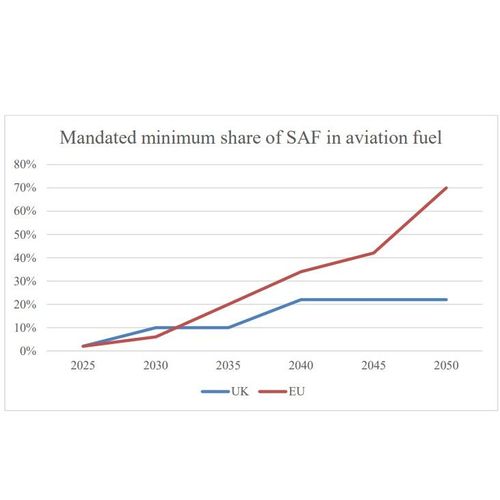UK SAF mandate comes into force

SOURCE: USDA FAS GAIN
January 6, 2025
BY Erin Krueger
The U.K.’s sustainable aviation fuel (SAF) mandate officially came into force on Jan. 1. By law, SAF must now account for at least 2% of all jet fuel in flights taking off from the U.K. The mandate is set to expand to 10% in 2030 and 22% in 2040.
The U.K. Department for Transport estimates the mandate should result in approximately 1.2 million metric tons of annual SAF consumption in the U.K. by 2030. That volume of fuel is enough to circle the globe 3,000 times.
In conjunction with the mandate, the U.K. government has confirmed it will introduce a revenue certainty mechanism for SAF producers to attract investment in new plants in the U.K. The Department for Transport said the revenue certainty mechanism will help reduce risk, give investors the confidence they need to invest in U.K. SAF plants and encourage the supply of SAF for the U.K. aviation sector. A new consultation on the revenue certainty mechanism is set to be launched in early 2025.
Advertisement
Advertisement
A report filed with the USDA Foreign Agricultural Service’s Global Agricultural Information Network in December discusses U.K. SAF policy, production and use.
The report predicts the 2% SAF mandate in place for 2025 will result in approximately 287.5 million liters (75.95 million gallons) of required SAF use this year. That volume is expected to increase to 1.5 billion liters by 2030. The U.K. consumed an estimated 14 billion liters of jet fuel last year, with SAF accounting for less than 1% of that volume. Total U.K. SAF consumption for 2023 was approximately 138 million liters, up from 48 million liters in 2022.
According to the report, the mandate will primarily apply to commercial flights rather than private aircraft as the obligation is on suppliers of jet fuel. Over the next five years, the mandate is expected to equate to an average annual increase of 1.6% SAF in the overall aviation fuel supply.
Advertisement
Advertisement
The mandate is being enforced via a traceable certificate scheme for aviation fuel suppliers. Suppliers will receive a certificate proportional to the amount of greenhouse gas (GHG) emissions reduction they achieved in the previous year. The certificates can then be used to meet the mandated obligations. Excess certificates can be sold to other suppliers who may need additional certificates.
According to the report, the mandate program also features a buy-out mechanism that allows obligated suppliers to discharge their obligations if they are unable to secure a supply of SAF, whether by imports or domestic production. The mechanism sets a maximum price for mandate certificates, which aims to prevent excessive costs from being passed on to consumers. The report also explains that the buy-out price is designed to encourage the supply and trading of SAF certificates over the use of the buy-out option, promoting actual emission reductions.
The U.K. currently has only one facility producing SAF, according to the report. That facility, owned by Phillps 66, is located in Yorkshire and co-processes waste oils. The refinery is expected to produce approximately 50 million liters of SAF this year. An additional eight SAF production facilities have been publicly announced and plan to begin production in the coming years.
A full copy of the report is available on the USDA FAS GAIN website.
Related Stories
The U.S. Energy Information Administration maintained its forecast for 2025 and 2026 biodiesel, renewable diesel and sustainable aviation fuel (SAF) production in its latest Short-Term Energy Outlook, released July 8.
XCF Global Inc. on July 10 shared its strategic plan to invest close to $1 billion in developing a network of SAF production facilities, expanding its U.S. footprint, and advancing its international growth strategy.
U.S. fuel ethanol capacity fell slightly in April, while biodiesel and renewable diesel capacity held steady, according to data released by the U.S. EIA on June 30. Feedstock consumption was down when compared to the previous month.
XCF Global Inc. on July 8 provided a production update on its flagship New Rise Reno facility, underscoring that the plant has successfully produced SAF, renewable diesel, and renewable naphtha during its initial ramp-up.
The U.S. EPA on July 8 hosted virtual public hearing to gather input on the agency’s recently released proposed rule to set 2026 and 2027 RFS RVOs. Members of the biofuel industry were among those to offer testimony during the event.
Upcoming Events










